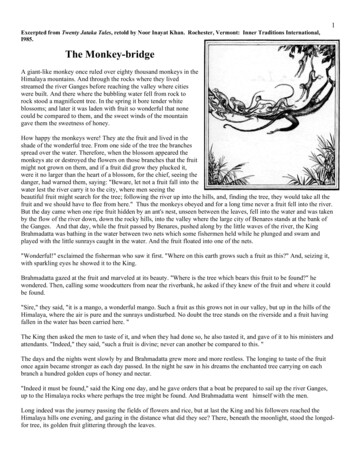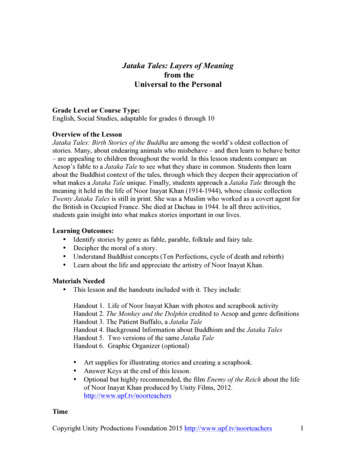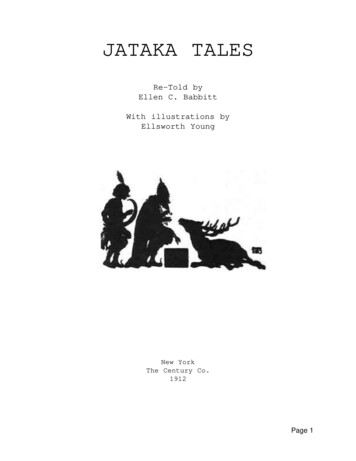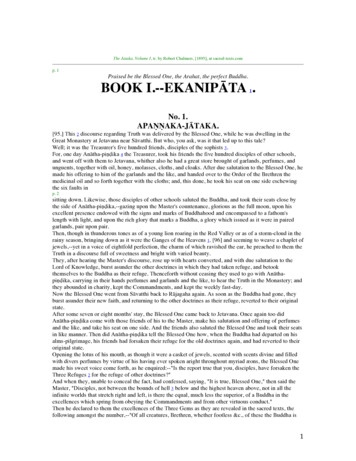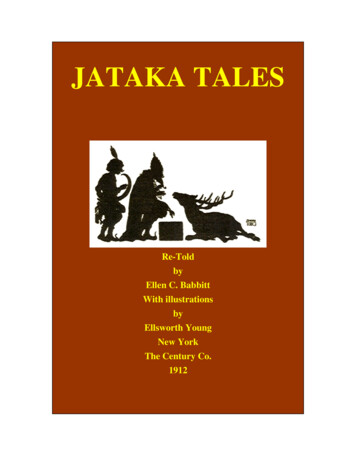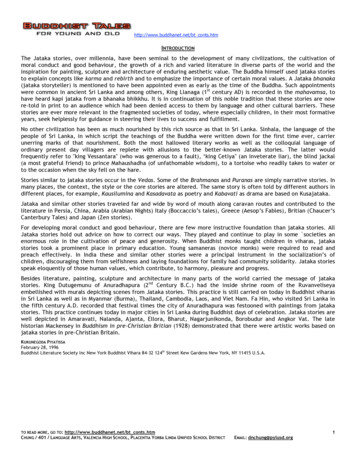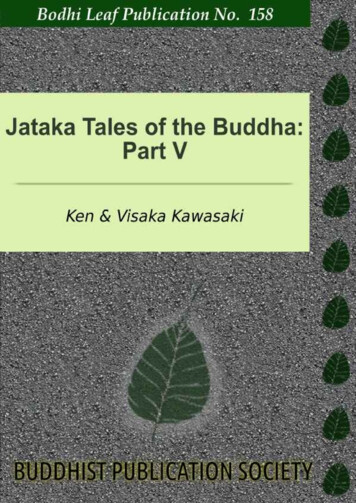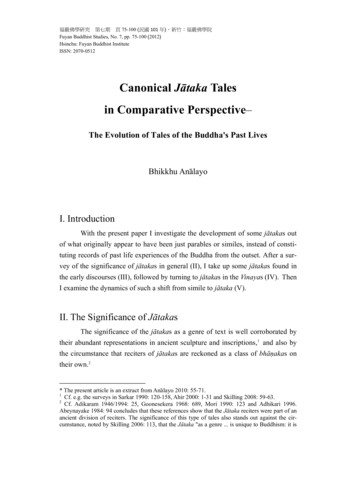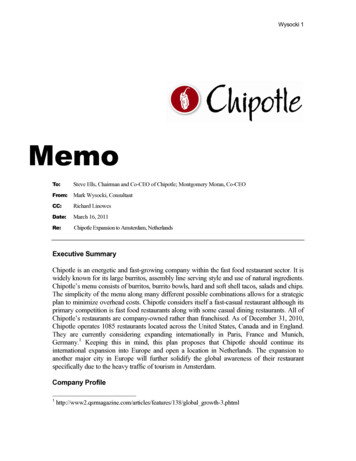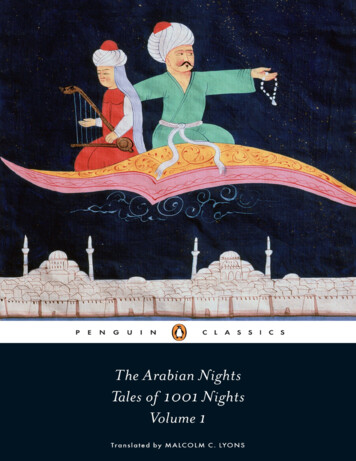
Transcription
Jataka Tales of theBuddha: Part IIRetold byKen & Visaka KawasakiBuddhist Publication SocietyKandy Sri LankaBodhi Leaves No: 138Copyright (c) Kandy; Buddhist Publication Society,(1996)BPS Online Edition (c) (2006)Digital Transcription Source: Access to InsightDhamma Transcription ProjectFor free distribution. This work may be republished,reformatted, reprinted and redistributed in anymedium. However, any such republication andredistribution is to be made available to the public on2
a free and unrestricted basis and translations andother derivative works are to be clearly marked assuch.3
Illisa JatakaThe Miserly Treasurer (Jat78)his story was told by the Buddha while atJetavana Monastery, about a tremendouslyrich royal treasurer, who lived in a towncalled Sakkara near the city of Rajagaha.He had been so tightfisted that he never gave awayeven the tiniest drop of oil you could pick up with ablade of grass. Worse than that, he wouldn't even usethat minuscule amount for his own satisfaction. Hisvast wealth was actually of no use to him, to hisfamily, or to the deserving people of the land.TMoggallana, however, led this miser and his wife toJetavana, where they served a great meal of cakes tothe Buddha and five hundred bhikkhus. After hearingwords of thanks from the Buddha, the royal treasurerand his wife attained stream-entry.That evening the bhikkhus gathered together in theHall of Truth. "How great is the power of theVenerable Moggallana!" they said. "In a moment he4
converted the miser to charity, brought him toJetavana, and made possible his attainment. Howremarkable is the elder!" While they were talking, theBuddha entered and asked the subject of theirdiscussion.When they told him, the Buddha replied, "This isnot the first time, bhikkhus, that Moggallana hasconverted this miserly treasurer. In previous days toothe elder taught him how deeds and their effects arelinked together." Then the Buddha told this story ofthe past.Long, long ago, when Brahmadatta was reigning inBaranasi, there was a treasurer named Illisa who wasworth eighty crores of wealth. This man had all thedefects possible in a person. He was lame andhunchbacked, and he had a squint. He was aconfirmed miser, never giving away any of his fortuneto others, yet never enjoying it tions back his ancestors had been bountiful,giving freely of their best. When this treasurerinherited the family riches, he broke that tradition andbegan hoarding his wealth.One day, as he was returning from an audience withthe king, he saw a weary peasant sitting on a benchand drinking a mug of cheap liquor with great gusto.5
The sight made the treasurer thirsty for a drink ofliquor himself, but he thought, "If I drink, others willwant to drink with me. That would mean a ruinousexpense!" The more he tried to suppress his thirst, thestronger the craving grew.The effort to overcome his thirst made him asyellow as old cotton. He became thinner and thinneruntil the veins stood out on his emaciated frame. Aftera few days, still unable to forget about the liquor, hewent into his room and lay down, hugging his bed.His wife came in, rubbed his back, and asked,"Husband, what is wrong?""Nothing," he said."Perhaps the kig is angry with you," she suggested."No, he is not.""Have your children or servants done anything toannoy you?" she queried."Not at all.""Well, then, do you have a craving for something?"Because of his preposterous fear that he might wastehis fortune, he still would not say a word."Speak, husband," she pleaded. "Tell me what youhave a craving for.""Well," he said slowly, "I do have a craving for one6
thing.""What is that, my husband?""I want a drink of liquor," he whispered."Why didn't you say so before?" she exclaimed withrelief. "I'll brew enough liquor to serve the wholetown.""No!" he cried. "Don't bother about other people. Letthem earn their own drink!""Well then, I'll make just enough for our street.""How rich you are!""Then, just for our household.""How extravagant!""All right, only us and our children.""Why fuss about them?""Very well, let it be just enough for the two of us."Do you need any?""Of course not. I'll brew a little liquor only for you.""Wait! If you brew any liquor in the house, manypeople will see you. In fact, it's out of the question todrink any here at all." Producing one single penny, hesent a slave to buy a jar of liquor from the tavern.When the slave returned, Illisa ordered him to carry7
the liquor out of town to a remote thicket near theriver. "Now leave me alone!" Illisa commanded. Afterthe slave had walked some distance away, thetreasurer crawled into the thicket, filled his cup, andbegan drinking.At that moment, the treasurer's own father, whohad been reborn as Sakka, king of the devas,happened to be wondering whether the tradition ofgenerosity was still kept up in his house and becameaware of his son's outrageous behavior. He realizedthat his son had not only broken with the customarymagnanimity of his family, but that he had alsoburned down the alms houses and beaten the poor todrive them away from his gate. Sakka saw that hisson, unwilling to share even a drop of cheap liquorwith anyone else, was sitting in a thicket drinking byhimself.When he saw this, Sakka cried, "I must make myson see that deeds always have their consequences. Iwill make him charitable and worthy of rebirth in therealm of the devas."Instantly, Sakka disguised himself as his son,complete with his limp, hunchback, and squint, andentered the city of Baranasi. He went directly to thepalace gate and asked to be announced to the king."Let him approach," said the king.8
Sakka entered the king's chamber and paid hisrespects."What brings you here at this unusual hour, my lordhigh treasurer?" asked the king."I have come, sire, because I would like to add myeighty crores of wealth to your royal treasury.""No, my lord high treasurer," answered the king. "Ihave ample treasure. I have no need of yours.""Sire, if you will not take it, I will give it all away toothers.""By all means, treasurer, do as you wish.""So be it, sire," Sakka said. Then, bowing again tothe king, he went to the treasurer's house. None of theservants could tell that he was not their real master.He sent for the porter and ordered, "If anybodyresembling me should appear and claim to be masterof this house, that person should be severely beatenand thrown out." Then he went upstairs, sat down ona brocaded couch, and sent for Illisa's wife. When shearrived, he smiled and said, "My dear, let us bebountiful."When his wife, his children, and all the servantsheard this, they thought, "We have never seen thetreasurer in this frame of mind! He must have drunk alot to have become so good-natured and generous."9
His wife answered, "Be as charitable as you please,my husband.""Send for the town crier," Sakka ordered. "I wanthim to announce to all the citizens of the city thatanybody who wants gold, silver, diamonds, pearls, orother gems should come to the house of Illisa thetreasurer."His wife obeyed him, and a large crowd of peoplecarrying baskets and sacks soon gathered. Sakkainstructed the servants to open the doors to the storerooms and announced to the people, "These are mygifts to you! Take what you like! Good luck to you!"Townspeople filled their bags and carried away allthe treasure they could manage. One farmer yokedtwo of Illisa's oxen to a beautiful cart, filled it withvaluable things, and drove out of the city. As he rodealong, humming a tune in praise of the treasurer, hehappened to pass near the thicket where Illisa washiding. "May you live to be a hundred, my good lordIllisa!" sang the farmer. "What you have done for methis day will enable me to live without ever toilingagain. Who owned these oxen? You did! Who gave methis cart? You did! Who gave me the wealth in thecart? Again it was you! Neither my father nor mymother gave me any of this. No, it came solely fromyou, my lord."10
These words chilled the treasurer to the bone. "Whyis this fellow mentioning my name?" he wondered tohimself. "Has the king been giving away my wealth?"He peeped out of the thicket and immediatelyrecognized his own cart and oxen.Scrambling out of the bushes as fast as he could, hegrabbed the oxen by their nose rings and cried, "Stop!These oxen belong to me!"The farmer leaped from the cart and began beatingthe intruder. "You rascal!" he shouted. "This is none ofyour business. Illisa the treasurer is giving his wealthaway to all the city." He knocked the treasurer down,climbed back on the cart, and started to drive away.Shaking with anger, Illisa picked himself up,hurried after the cart, and seized hold of the oxenagain. Once more the farmer jumped down, grabbedIllisa by the hair, and beat him severely. Then he gotback on the cart and rumbled off.Thoroughly sobered up by this rough handling,Illisa hurried home. When he arrived, he saw thepeople carrying away his treasure. "What are youdoing? he shouted. "How dare you do this?" He seizedfirst one man then another, but every man he grabbedknocked him down.Bruised and bleeding, he tried to go into his ownhouse, claiming that he was Illisa, but the porters11
stopped him. "You villain!" they cried. "Where do youthink you are going?" Following orders, they beat himwith bamboo staves, took him by the neck, and threwhim down the steps."Only the king can help me now," groaned Illisa,and he dragged himself to the palace."Sire!" he cried. "Why, oh why, have you plunderedme like this?""I haven't plundered you, my lord high treasurer,"said the king. "You yourself first offered me yourwealth. Then you yourself offered your property tothe citizens of the town.""Sire, I never did such a thing! Your majesty knowshow careful I am about money. You know I wouldnever give away so much as the tiniest drop of oil.May it please your majesty to send for the person whohas squandered my riches. Please interrogate himabout this matter."The king ordered his guards to bring Illisa, and theyreturned with Sakka. The two treasurers were soexactly alike that neither the king nor anyone else inthe court could tell which was the real treasurer."Sire!" pleaded Illisa. "I am the treasurer! This is animposter!""My dear sir," replied the king. "I really can't say12
which of you is the real Illisa. Is there anybody whocan distinguish for certain between the two of you?""Yes, sire," answered Illisa, "my wife can."The king sent for Illisa's wife and asked her whichof the two was her husband. She smiled at Sakka andwent to stand beside him. When Illisa's children andservants were brought and asked the same question,they all answered that Sakka was the real treasurer.Suddenly, Illisa remembered that he had a wart onthe top of his head, hidden under his hair, known onlyto his barber. As a last resort, he asked that his barberbe called. The barber came and was asked if he coulddistinguish the real Illisa from the false."Of course, I can tell, sire," he said, "if I may examinetheir heads.""By all means, look at both their heads," ordered theking.The barber examined Illisa's head and found thewart. As he started to examine Sakka's head, the kingof the devas quickly caused a wart to appear on hisown head, so that the barber exclaimed, "YourMajesty, both squint, both limp, and both arehunchbacks, too! Both have warts in exactly the sameplace on their heads! Even I cannot tell which is thereal Illisa!"13
When Illisa heard this, he realized that his last hopewas gone, and he began to quake at the loss of hisbeloved riches. Overpowered by his emotions, hecollapsed senseless on the floor. At this, Sakkaresumed his divine form and rose into the air. "O king,I am not Illisa," he announced. "I am Sakka!"The king's courtiers quickly splashed water onIllisa's face to revive him. As soon as he had recoveredhis wits, the treasurer staggered to his feet and bowedbefore Sakka."Illisa!" Sakka shouted. "That wealth was mine, notyours. I was your father. In my lifetime I wasbountiful towards the poor and rejoiced in doinggood. Because of my charity, I was reborn in this greatgrandeur. But you, foolish man, are not walking in myfootsteps. You have become a terrible miser. In orderto hoard my riches, you burned my alms houses to theground and drove away the poor. You are getting noenjoyment from your wealth; nor is it benefiting anyother human being. Your treasury is like a poolhaunted by demons, from which no one may satisfyhis thirst."If you rebuild my alms houses, however, and showcharity to the poor, you will gain great merit. If you donot, I will take away everything you have, and I willsplit your head with my thunderbolt."14
When Illisa heard this threat, he shook with fear andcried out, "From now on I will be bountiful! I swear it!"Accepting this promise, Sakka established his son inthe precepts, preached the Dhamma to him, andreturned to the realm of the devas.True to his word, Illisa became diligent in charityand performed many good works. He even attainedrebirth in heaven."You see, bhikkhus," the Buddha said, "this is notthe first time that Moggallana has converted thismiserly treasurer. At that time, the treasurer was Illisa;Moggallana was Sakka, king of the devas; Anandawas the king; and I myself was the barber."Kalakanni JatakaWhat's in a Name?Jat 8315
The Buddha told this story while at Jetavana, aboutone of Anathapindika's friends, a man named "Curse."The two had played together as children and had goneto the same school. As the years passed, however, thefriend became extremely poor and could not make aliving for himself no matter what he did. Indesperation, he approached Anathapindika, whowelcomed him kindly and employed him to look afterhis property and to manage all of his business for him.From that time on, it was a common thing to hearsomeone shouting, "Curse!" each time a member of thehousehold spoke to him.One day some of An
Illisa Jataka The Miserly Treasurer (Jat 78) his story was told by the Buddha while at Jetavana Monastery, about a tremendously rich royal treasurer, who lived in a town called Sakkara near the city of Rajagaha. He had been so tightfisted that he never gave away even the tiniest drop of oil you could pick up with a blade of grass. Worse than .
